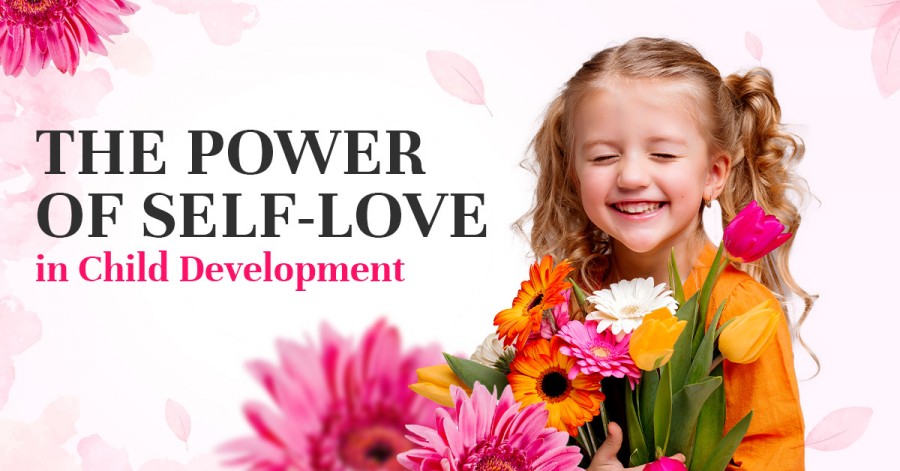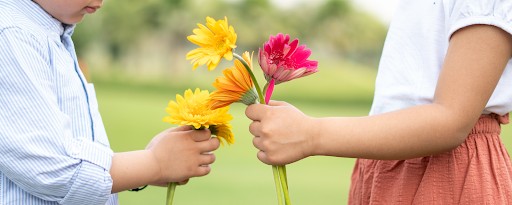The Power of Self-Love in Child Development
Published 29 August 2023 at 09:00
Tickikids Blog Singapore > Digest > The Power of Self-Love in Child Development

In the tapestry of life, there is one thread that weaves through every experience, every challenge, and every triumph: self-love. Just as the first rays of dawn kiss the world awake, teaching children to love themselves from a young age is akin to sowing seeds that will bloom into a resilient garden of confidence, compassion, and happiness. As parents, caregivers, and mentors, we hold the paintbrush to the canvas of their self-perception, with the power to colour it with shades of positivity, kindness, and unwavering self-assurance.

What is Self-Love? Understanding the Concept in a Child-Friendly Way
Imagine a secret garden nestled within each child's heart – a place where they can find solace, joy, and acceptance. Self-love is the key that opens the gate to this garden. It's about helping children understand that just as they care for their favourite teddy bear or nurture a fledgling plant, they too deserve the same tender love and care. Self-love is not about being perfect, but about embracing oneself with all the quirks and uniqueness that make each child special.
The Impact of Early Self-Love on Lifelong Happiness
As we guide children towards self-love, we lay the foundation for their future well-being. When children know and believe they are valuable, capable, and deserving of happiness, they develop resilience in the face of challenges. Just as a tree with strong roots can weather any storm, children armed with self-love are equipped to navigate the ups and downs of life with grace and determination.
The Role of Parents and Caregivers in Fostering Self-Love
Parents and caregivers are the guiding stars in a child's life. By modelling self-love and self-care, we create a roadmap for children to follow. When children see us treating ourselves with kindness and respect, they learn that these actions are not only acceptable but essential.
Cultivating Emotional Intelligence: Teaching Kids to Recognise and Express Their Feelings
Emotional intelligence is the cornerstone of self-love. Teaching children to identify and communicate their feelings fosters a deep sense of self-awareness. Just as we help them learn the alphabet, let's also guide them in understanding the language of emotions – a skill that will serve them throughout their lives.
Encouraging Positive Self-Talk: Turning Inner Critic into Inner Cheerleader
The way we speak to ourselves becomes the tapestry of our self-perception. Encouraging children to replace negative self-talk with gentle, positive affirmations empowers them to become their own biggest supporters. Imagine the magic of a world where children are their own cheerleaders, boosting their confidence and self-esteem.

The Symbolic Gesture of Self-Appreciation: How Buying Flowers Can Teach Kids About Self-Love
Consider the act of buying flowers as a metaphor for self-love. Just as we pick the most beautiful blooms for a loved one, encourage children to do the same for themselves. Through this simple act, they learn to value and celebrate their own worth.
Exploring the Connection Between Nature and Nurturing Self-Worth
Nature mirrors the essence of self-love – ever-changing, diverse, and infinitely beautiful. When children immerse themselves in the natural world, they learn that just as each flower has its unique charm, they too are an essential part of life's intricate tapestry.
Celebrating Uniqueness: Helping Children Embrace Their Special Qualities
Just as each snowflake is unique, so too is every child. Encourage them to celebrate their individuality – from their interests and talents to their quirks and idiosyncrasies. By showing them that their differences are what make them extraordinary, we nurture a sense of self-acceptance that will empower them to face the world with confidence.
Encouraging Exploration: How Allowing Kids to Try New Things Boosts Their Confidence
Confidence is like a muscle that grows stronger with use. Encourage children to step outside their comfort zones and explore new activities. Each small achievement becomes a stepping stone, building their belief in their abilities and fostering a sense of accomplishment.

Spreading Sunshine: How Acts of Kindness Can Elevate a Child's Self-Image
Kindness has the power to transform not only the lives of others but also the way we see ourselves. Encourage children to perform acts of kindness, both for others and for themselves. These moments of generosity create a ripple effect that boosts their self-esteem and fills their hearts with warmth
Planting Seeds of Gratitude: Teaching Children to Appreciate Themselves and Others
Gratitude is the sunshine that nurtures self-love. Teach children to appreciate their own strengths, achievements, and even their challenges. By cultivating an attitude of gratitude towards themselves, they learn to value their worth and embrace their journey.
Connection with Others: Exploring How Positive Relationships Reinforce Self-Love
Relationships are mirrors that reflect our self-worth. Teach children to surround themselves with those who uplift and cherish them. Positive relationships foster an environment where self-love can flourish, empowering them to set healthy boundaries and choose connections that nurture their well-being.
Setting Boundaries: Teaching Kids to Prioritize Their Well-being in Relationships
Just as a garden needs fences to protect its blooms, children need boundaries to safeguard their self-love. Guide them in setting limits that honour their feelings and well-being. By valuing themselves enough to set boundaries, they learn that their needs are valid and worthy of respect.
Nature as a Reflective Mirror: Helping Children See Their Worth in the Beauty of the World
Nature holds a mirror to our inner selves, reflecting the beauty and wonder that reside within us. Encourage children to spend time in nature, allowing its serene landscapes to remind them of their innate worth and the profound interconnectedness of all life.

Mindfulness in the Outdoors: Encouraging Children to Embrace Moments of Stillness
Amidst the busyness of life, nature offers a sanctuary of stillness. Teach children the art of mindfulness – of being fully present in the moment. These moments of quiet reflection allow them to listen to their hearts, nurturing a deep connection with themselves.
In the rhythm of nurturing self-love, one thread stands out – self-care. Just as a gardener tends to their plants, children too need care, nourishment, and moments of rest to thrive. This journey of self-care is not selfish but essential, as it teaches them that they are deserving of love and attention.
The Magic of Stories: How Books Can Instil Lessons of Self-Love and Acceptance
Stories hold the power to touch hearts and transform minds. Introduce children to stories that celebrate self-love, acceptance, and resilience. Through the characters' journeys, children learn that their feelings and experiences are universal, fostering a sense of connection and self-compassion.
Recommending Age-Appropriate Books that Celebrate Self-Worth
Here are a few recommended titles that can guide children towards embracing self-love and understanding their inherent worth:
- "The Little Engine That Could" by Watty Piper;
- "I Like Myself!" by Karen Beaumont;
- "Giraffes Can't Dance" by Giles Andreae;
- "Stand Tall, Molly Lou Melon" by Patty Lovell.